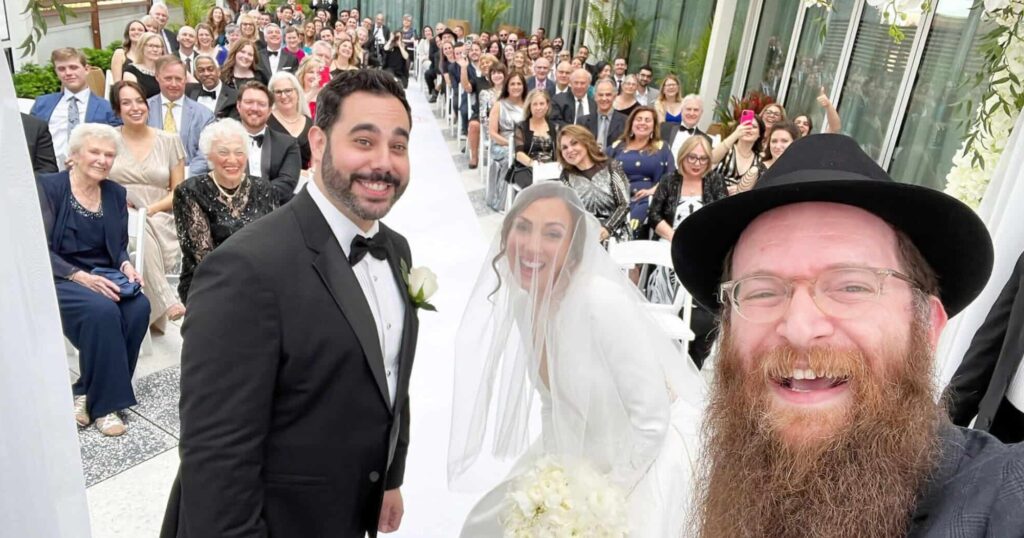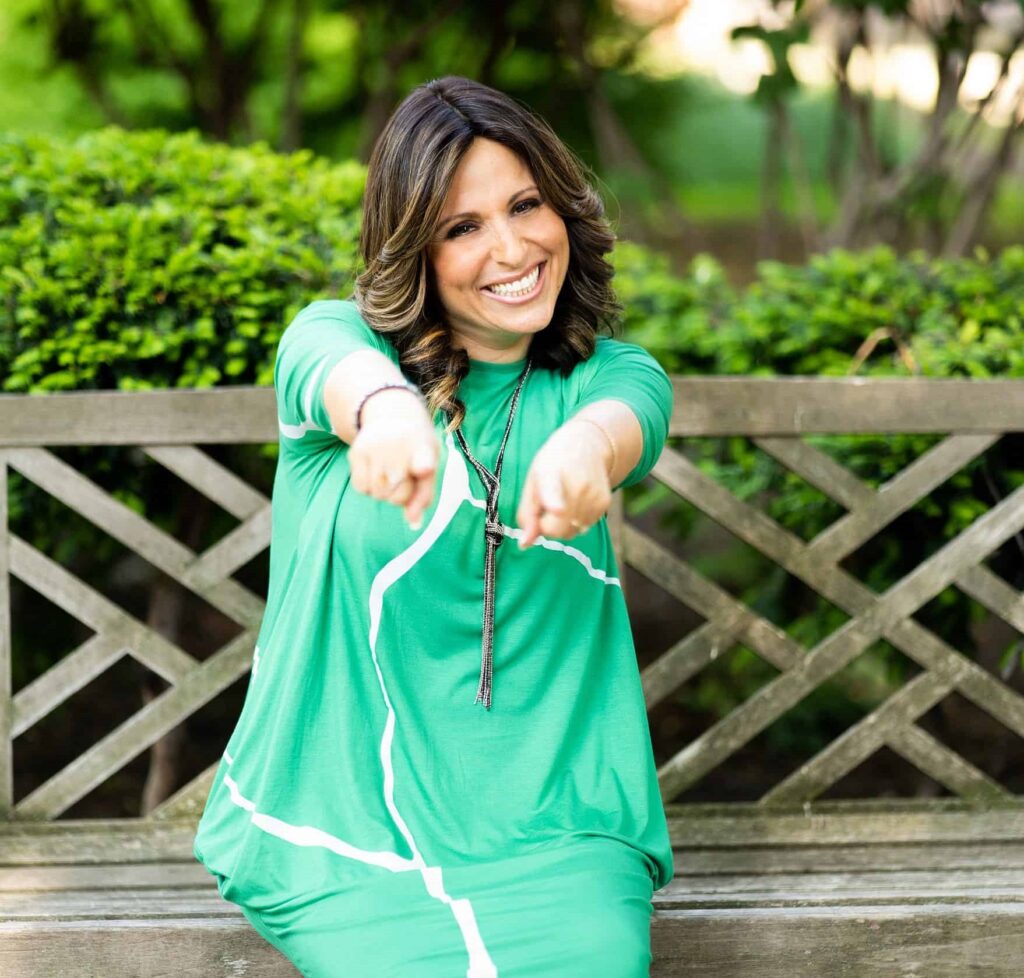
Rabbi Yisroel Bernath at a Jewish wedding. Credit: Courtesy.
“I’d have to call no-marriage the silent killer,” says media matchmaker Aleeza Ben Shalom. “No marriage, no kids—it’s tough on the Jewish future.”
At 33, Steven Reich has begun to get serious about finding Ms. Right.
“The brevity of life started to hit me, and I realized a part of life that I really want is growing a marriage and a family,” he says.
Reich is not alone, notes media matchmaker Aleeza Ben Shalom. Nor is he so different from the tens of thousands of other Jewish singles who flock to her and other matchmakers each year, as well as to online dating sites and Facebook groups. Not to mention the millions of viewers who tuned in last year to Ben Shalom’s Netflix series “Jewish Matchmaking.”
“They don’t know how it happened—they were just living their life—when suddenly they realized that they’re getting older with no spouse in sight,” she says. “And it strikes them that the older they get, finding the right one to start a family with gets harder.”
Because as concerning as intermarriage is, the specter of no marriage is equally daunting.

Aleeza Ben Shalom. Credit: Courtesy.
About two-thirds of the U.S. Jewish adults are either married (59%) or living with a partner (7%), according to a 2020 Pew Research Center study on marriage, families and children among U.S. Jews. Studies show that the non-Orthodox (about 91% of American Jews) are postponing marriage until they’re older, reports sociologist and retired Hebrew University professor Steven Cohen.
“I’d have to call no-marriage the silent killer,” says Ben Shalom. “No marriage, no kids—it’s tough on the Jewish future.” Her online program, “Forty Days to Connection with God, Yourself and Your Future Soulmate,” begins in early September.
The subject of Jewish marriage is back in the spotlight, thanks to a little-known holiday. A matchmaking day during Second Temple times, Tu B’Av (the 15th day of the Jewish month of Av) invited women to dance through the vineyards in borrowed white dresses (so no one could tell who was rich or poor), hoping to catch a young man’s eye. These days the holiday, which this year takes place on Aug. 18-19, has evolved into a sort of Jewish Valentine’s Day, minus the chocolate hearts.
Many Jewish millennials, disheartened by all the frogs they’ve had to kiss and the Seinfeld perma-single lifestyle dotted with casual couplings or “friendships with benefits,” suddenly find themselves highly motivated to find the right one, says Ben Shalom.
In fact, at 33, Reich is on the younger end of those receiving the wake-up call. Typically, it’s 35 to 37 for women, “whose limited fertile years give them greater time sensitivity,” and 46 to 49 for men, she reports, though much younger for the more religious. “Forty scares women and 50 scares men,” she says, “though there are men like Steven who wake up much earlier.”
But where is the communal support? “The Jewish community is so focused on the very real problem of intermarriage that they’re missing the great crisis that is no-marriage,” says Yisroel Bernath (aka the “Love Rabbi”), a Chabad rabbi in Montreal, in addition to a filmmaker and matchmaker with more than 240 marriages under his belt.
And there are reasons why many millennials are marriage-adverse, he maintains. “Everyone tells them they’re perfect the way they are; their lives are filled with jobs, friends and fun—nothing is missing.” In addition, they often lack marital role models since many of their parents are either divorced or unhappily married, he says.
“So, who needs that? If you don’t know what a happy marriage looks like you can’t know what you’re missing,” he states.
Ben Shalom says that career-building (including graduate/professional school) can easily last into one’s 30s and beyond, often delaying marriage. “People who think they have to be established to find their person have it backwards,” she says.
Moreover, building lasting love takes time and patience: “Whereas young people growing up in an instant gratification world think ‘I’m ready to settle down now’ means it should happen instantly,” says Bernath.
To clear the path for marriage, these experts suggest a variety of strategies:
Make marriage come first. “Your future spouse needs love and commitment more than a lot of financial success,” says Ben Shalom whose new book Matchmaker, Matchmaker, Find Me a Love That Lasts is pre selling before its December release.
Update your dreams. “People mature but their ideal mate hasn’t changed since they were 25,” she adds. “They say, ‘I’m young at heart’ or ‘age is just a number,’ when a young partner isn’t always in the cards.”
Try a values search. “Ask yourself the values you want the person to have and to transmit to any kids who come along because who I’m drawn to isn’t always the same person I want to build a home with,” says Ben Shalom.
Share your life. “Live with a roommate until you find your person,” she adds. “Living alone too long you can become inflexible.”
Push yourself. “Get out of your comfort zone to singles events and programs,” says Ben Shalom. “And up the networking, letting friends and coworkers know you’re now searching in earnest for the right person to share your life with.”
Maximize your online presence. “Post a high-quality photo that shows your eyes and switch sites and photos every two months,” she adds. “And remember, answering ‘Jewish’ and ‘kosher style’ can show you care about your Judaism.”
Make room for love. “Clear half your bureau out, sit on one side of the table and sleep on one side of the bed,” says Rabbi Bernath. “It will remind you to be open to sharing your life—and your home—and that someone is missing.”
Know when to hold ’em. “Remember that, though you need to share certain non-negotiable values, you also need to be flexible in other areas,” says Bernath.
Follow a working model. Find a happy healthy relationship to model, advises the rabbi. “See how they treat each other and ask them their secrets of resolving conflicts respectfully when they arise.”
Keep your eyes open. “At an event, don’t say ‘hi’ and rush off to someone else,” he adds. “You may have been speaking with your future spouse without taking the time to really see them … they may be hiding like Waldo, so keep your eyes and heart open.”
But when the search is successful, the real work begins, building a tensile enough bond to survive the ups and downs of marriage, he says. “I want to stand under the chuppah and make sure my blessings aren’t in vain,” says the rabbi. “So, I give them the tools to make a strong union, showing them that Jewish marriage is about the love you give your spouse and not what you’ll get from them—that a values-based bond (versus superficial and fun) can only happen between two committed adults.”
“I’m beginning to realize that just because one relationship didn’t work out, it doesn’t mean the whole marriage thing isn’t for me,” says Reich. “I’ve got to remember, she’s out there and she’s looking for me, too.”
This column (unedited) previously ran on JNS.org
